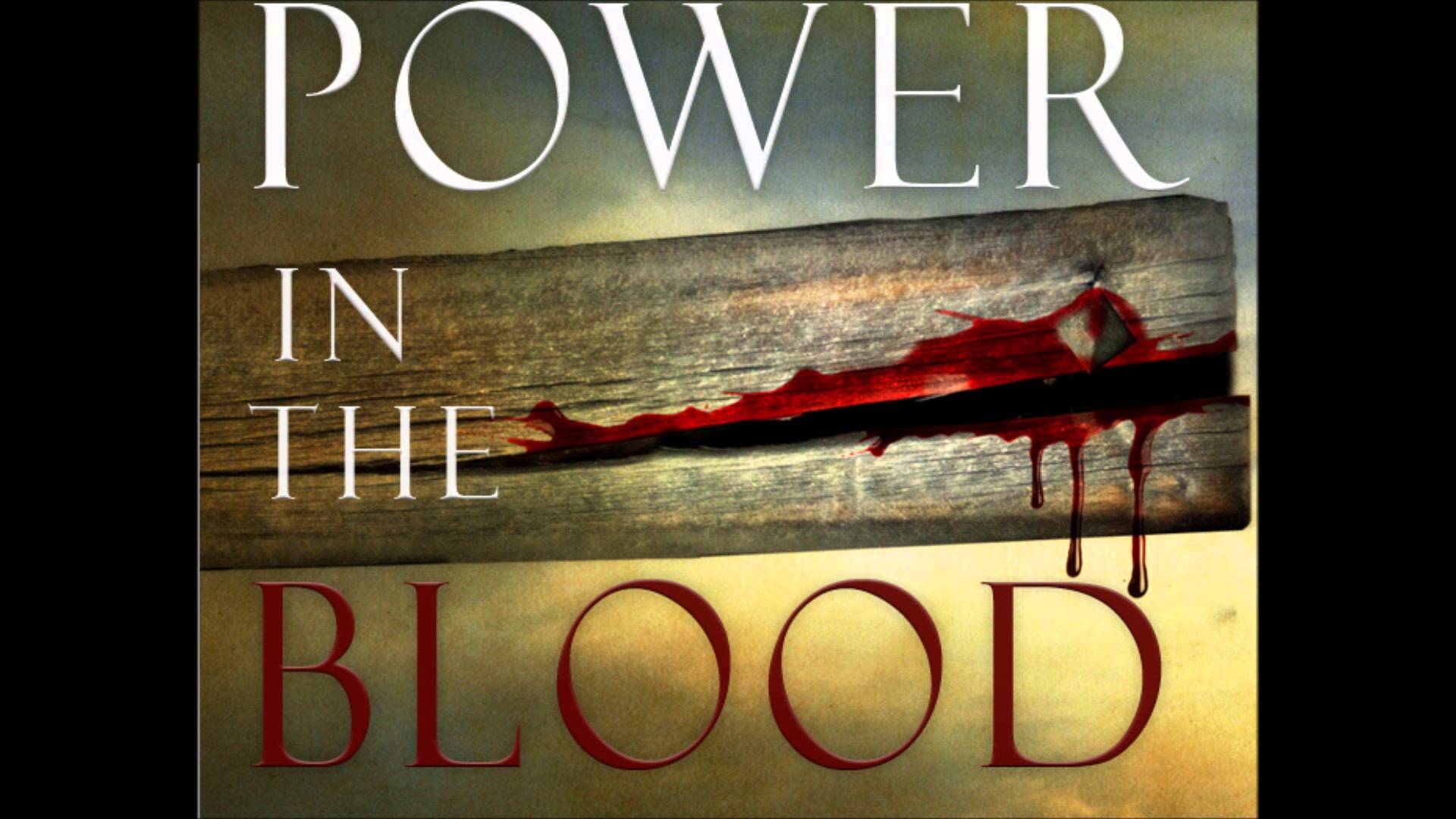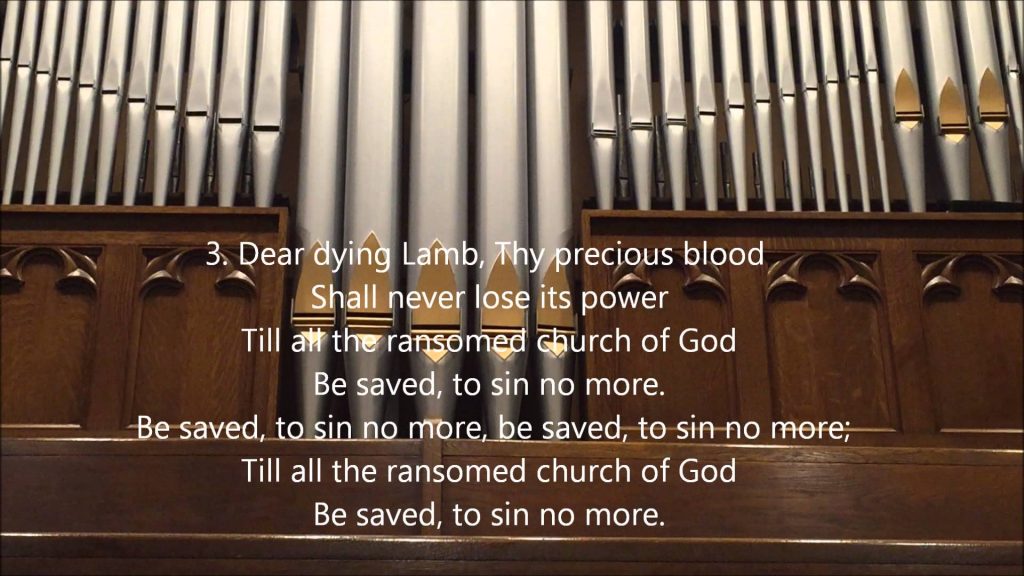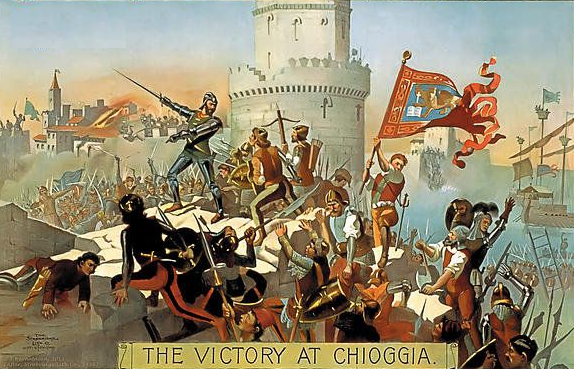Editor’s Note: We offer another sermon from Andrew Murray.
“Peter… to… the elect according to the foreknowledge of God the Father, in sanctification of the Spirit unto obedience and the sprinkling of the blood of Jesus Christ: grace unto you, and peace, be multiplied.” 1 Peter 1:1, 2.
The Tri-unity of the Godhead is often considered as merely a matter of doctrine, and having no close relationship to the Christian life.
This is not the view of the New Testament, when it describes the work of redemption, or the idea of the life of God. In the Epistles the three Persons are constantly named together, so that in each activity of grace all three together have a share in it. God is triune; but in everything that He does, and at all times, the Three are One.
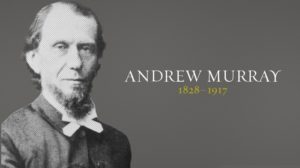
This is in entire agreement with what we see in nature. A trinity is found in everything. There is the hidden, inner nature; the outward form; and the effect. It is not otherwise in the Godhead. The Father is the eternal being-I AM-the hidden foundation of all things, and fountain of all life. The Son is the outward form, the express image, the revelation of God.
The Spirit is the executive power of the Godhead. The nature of the hidden unity is revealed and made known in the Son, and that is imparted to us and is experienced by us through the agency of the Spirit. In all Their activities the Three are inseparably One.
Everything is of the Father, everything is in the Son, everything is through the Spirit.
In the words of our text, which Peter writes to believers to whom also he sends his greetings, we find the relationship in which each redeemed one stands to the three persons of the Godhead is clearly set forth.
- They are elect “according to the foreknowledge of God.” The source of our redemption is in the counsel of God.
- They are chosen “in sanctification of the Spirit”: the entire carrying out of the counsel of God is through the Holy Spirit, and the sanctification and the impartation of divine holiness which He works.
- They are elect “to obedience and the sprinkling of the blood of Jesus Christ”: the final purpose of God is the restoration of man to a state where the will of God will be done on earth, as it is done in heaven, and where everything will redound to the glory of the free grace which has been revealed so gloriously in the death and blood of the Son of God.
The place which “the sprinkling of blood” takes is most remarkable. It is mentioned last, as the great final end, in which according to the foreknowledge of the Father, the sanctification of the Spirit, and submission to the obedience of Christ, it finds completion.
In order that we may understand its place and worth in redemption, let us consider it in the light of:
- The Glorious Purpose of the Triune God.
- The Mighty Power by which that Purpose was Attained.
- The Counsel in which Everything Originated.
- The Purpose of the Triune God.
Christians are described as “elect unto… obedience and the sprinkling of the blood of Jesus Christ.” In the Holy Trinity the place occupied by the Lord Jesus is characterized by the name which He bore as “the only-begotten Son of God.” He is literally and really the only One with whom God the Father can or will have anything to do. As the Son, He is the mediator through whom God wrought in creation, and by whom the creature can draw near to God.
God dwells in the hidden and unapproachable light of a consuming fire: Christ is the Light of Lights, the light in which we can view and enjoy the Deity. And the eternal election of God can have no higher purpose than to give us a share in Christ, and through Him, approach to the Father Himself. Because of sin there was no possibility for man again to be brought near to God, save through reconciliation, by means of the sprinkling of the blood of Christ. Scripture speaks of Him as the “Lamb slain before the foundation of the world.”
It is stated that we are elect… to the sprinkling of the blood of Christ, which means that God ever and always saw that the only way by which salvation could be made possible for us, the only needful thing by which the door of Heaven could be opened for us, and the right and fitness procured for us to obtain a share in all the blessings of His love, was by the sprinkling of the blood. And it tells us further that when the blood occupies the place in our eyes and hearts that it occupies in the eye and heart of God, we shall then certainly enter into the full enjoyment of what He has acquired for us by it.
What these blessings are is clearly revealed to us in the Word of God. “You who were afar off have been brought nigh through the blood.” “We have liberty to enter into the most holy place through the blood.” “He has cleansed us from our sins by His blood.” “How much more shall the blood of Christ purge your conscience to serve the Living God.” “The blood of Jesus Christ cleanses from all sin.” Many such statements show us that the cleansing and fitness to draw near to God, that the true and living entrance into fellowship with Him, is the blessed effect of “the sprinkling of blood” on our heart and conscience.
In the depths of eternity that blood of sprinkling was the object of the unspeakable good pleasure of the Father, as the means of the redemption of His elect. Is it not obvious that when that blood becomes the good pleasure and joy of a sinner, and he seeks life and salvation in that blood, then the heart of God and the heart of the sinner meet one another, and an inner agreement and fellowship, which nothing can break, is found in the blood? The Father has elected us to the sprinkling of the blood, that we may heartily accept of it, and find our entire salvation in it.
There is still another word to consider: elect to obedience and the sprinkling of the blood of Jesus Christ. Here the two sides of the life of grace are placed together for us in a most striking way. In “the sprinkling of blood” we learn what Christ has done for, and to us; in “obedience” we have what is expected from us. The creature can have no other blessedness than that found in the will of God, and in the doing of it as it is done in heaven.
The Fall was simply the turning away of man from God’s will, to do his own will. Jesus came to alter this, and to bring us again into obedience; and God lets us know that He, in His eternal choice, had these two things in view: “obedience” and “the sprinkling of the blood.” The placing together of these two words teaches us the very important lesson that obedience and the sprinkling of blood are inseparably united. It was so with the Lord Jesus. Apart from His obedience the shedding of His blood would have been of no value. The blood is the life; life consists of disposition and will.
The power of Jesus’ blood lies wholly in this, that He offered Himself without spot to God, to do His will, subjecting His own will utterly to 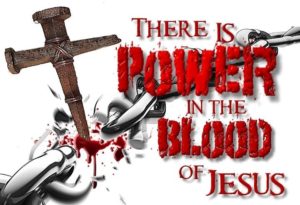 the will of God. “He became obedient unto death, therefore God hath highly exalted Him.” He who receives the blood of Jesus receives with it, as his life, His disposition of utter obedience to God. “Obedience and the sprinkling of the blood” are inseparably bound together. The disposition manifested by Christ, in the shedding of His blood, must become the disposition of those on whom it has been sprinkled.
the will of God. “He became obedient unto death, therefore God hath highly exalted Him.” He who receives the blood of Jesus receives with it, as his life, His disposition of utter obedience to God. “Obedience and the sprinkling of the blood” are inseparably bound together. The disposition manifested by Christ, in the shedding of His blood, must become the disposition of those on whom it has been sprinkled.
He who desires to have the benefit of the blood must first submit himself to an obedience of faith, which must characterize his whole life. He must understand that “the blood” is constantly crying: “God’s will must be done, even to death.” He who truly experiences the power of the blood of Jesus will manifest it by a life of obedience. In the heart of God, in the life and death of Christ, in the heart and life of the true Christian, these two things will always go together.
If any Christian asks why it is that he enjoys so little of the peace and cleansing of the blood, he may be almost certain that the reason is that he has not fully surrendered himself to be obedient. If anyone asks how he may obtain the full enjoyment of the power of the blood-the reply may be:- “Set yourself resolutely to obey God. Let your motto be: ‘My will in nothing-God’s will in everything’; that is what the blood of your Redeemer teaches you.” Do not separate what God from the beginning has joined together-obedience and the sprinkling of the blood-and you will thus be led into the fullness of blessing. From eternity God has elected you to both obedience and the sprinkling of the blood.
It may be that you shrink from this demand. Such obedience seems to you to be out of your reach, and as you hear about the power and blessedness obtainable by the sprinkling of the blood, even that seems to you to be out of reach. Do not be discouraged, but attend to what has yet to be said.
- The Mighty Power by which that Purpose was Attained.
The Holy Spirit is the great power of God. In the Holy Trinity He proceeds from the Father and the Son. He, by His omnipotent but hidden activity, executes the divine purpose; He reveals and makes known the Father and the Son. In the New Testament the word “Holy” is applied to Him more often than to the Father or the Son, and He is almost always called “the Holy Spirit” because it is He who from the inward being of God transfers holiness to the Redeemed. The life of God is where His holiness dwells.
Where the Holy Spirit imparts the Life of God, there He imparts and maintains the holiness of God, and thus is called the Spirit of sanctification. So the text says that we are “elect to obedience and the sprinkling of the blood of Christ by the sanctification of the Spirit.” It is committed to the Holy Spirit by His holy power to watch over us, and to fulfill God’s purpose in us. Elect in sanctification of the Spirit unto obedience.
The Spirit of sanctification and obedience: these two go together in the purpose of God. Here we have also a solution to the difficulty already mentioned, that it is not possible for us to render the obedience that God demands. Because God knew this much better than we do, He has made provision for it. He bestows upon us the Spirit of sanctification, who so renews our heart and inward nature, and fills us with His holy and heavenly power that it becomes really possible for us to be obedient. The one needful thing is that we should recognize and trust in the indwelling of the Holy Spirit, and follow His leading.
His inward activity is so gentle and hidden; He unites Himself so entirely with us and our endeavours, that we still imagine that it is our own thinking or willing, where He has already been the hidden Worker. Through this disregard of Him we cannot believe that when we have a conviction of sin, or a willingness to obey (both the result of His inward activity), that He has also power to perfect that work in us. Let him therefore, who really desires to be obedient, be careful persistently and quietly to maintain this attitude of trustful confidence: “The Spirit of God is in me”; and let him bow reverently before God with the prayer that He would “strengthen him with His Spirit, by power, in the inner man.”
In sanctification of the Spirit: this supplies the power which enables us to be obedient, and through which also we experience what the sprinkling of the blood means and imparts.
This is the reason why so many of God’s people have to complain that after all they have learned, and heard, and thought, and believed about the blood, they experience so little of its power. This is not to be wondered at, for that learning, and hearing, and thinking, and believing, is in a great part only a work of the understanding. And even when prayer is made for the Holy Spirit, it is all in expectation that He will give us clearer ideas of the truth. No-this is not the way.
The Spirit dwells in the heart: it is there He desires to do His first and greatest work. The heart must first be made right, and then the understanding will lay hold of the truth, not merely as a mental idea, but will preserve it within his Christian life. We are chosen in sanctification of the Spirit-not in the activities of the understanding-to the sprinkling of the blood.
Everyone who desires to know the power of the blood of Jesus must remember that the Spirit and the Blood bear witness together. It was by the shedding of the blood, and by the sprinkling of that blood before God in heaven, that the Spirit was free to come and dwell among us, and in us. It was to assure the hearts of the disciples concerning the glorious and powerful effect of the blood in heaven, in opening a free and bold entrance to God; and to make them partakers of the blessedness and power of the heavenly life that was now their portion, that the Holy Spirit was sent into their hearts.
The first Pentecost, in all its power and blessing, is our portion also; our inheritance. Would that we might cease to seek in our own strength salvation and blessings purchased for us by the blood. If only we began to live as those who have been led in sanctification of the Spirit to the full experience of what the blood can do, we should have, as never before, a real entrance into an eternal abiding-place near God, and fellowship with Him. We should know what it is to have a conscience cleansed by the blood, “to have no more conscience of sin,” to have the heart entirely cleansed from an evil conscience and so have liberty for an abiding intercourse with God. The Holy Spirit, as we commit ourselves to His leading, is able, in a moment, to bring us into that relationship to Him, in which we shall expect everything from Him.
We have seen what is the work of the Son, and of the Spirit; let us now ascend to see the place which the Father occupies.
- The Counsel in which Everything Originated.
Peter writes to “the elect according to the foreknowledge of God the Father, in sanctification of the Spirit, to obedience and the sprinkling of the blood of Jesus Christ.” The counsel of the Father is the origin of everything: and that in the Godhead as well as in the work of redemption. In the Godhead the Son proceeds from the Father, and the Spirit from the Father and the Son. The whole counsel of redemption is also solely “according to the purpose of Him who worketh all things after the counsel of His own will” (Eph. i. 11).
From the greatest-the ordering of the work of the Son and of the Holy Spirit-to the least-the conclusion of each dispensation in the history of His kingdom, with all occurrences in it, and the choice of those who will obtain a share in it-all this is the work of the Father. Sanctification of the Spirit, obedience, and the sprinkling of the blood, is the portion of the elect, according to the foreknowledge of the Father.
Scripture, without contradiction, teaches an eternal election. That this teaching should be strongly opposed, is because it is a divine mystery beyond human comprehension. That it has an appearance of unrighteousness, can be admitted. That it leads to conclusions which seem strange and terrible to our understanding, we do not deny. To comprehend it, man would need the omniscience and the wisdom of Him who sits upon the throne. And to take up our place on the throne, and give our judgment upon the eternal portion of mankind-may we be preserved from that! Our place is at the footstool of the throne, in deepest reverence; believing what God says, and adoring Him whose doings surpass all our thoughts.
Our text calls us not to reason about these hidden mysteries, but to rejoice, if we are believers, in what is revealed to us in it, and to make a practical use of it. And then this truth calls us to take special notice of the sure ground in which our expectation of salvation is rooted. The sprinkling of the blood, with the obedience which accompanies it, and the sanctification of the Spirit by which both of these reach their full authority over us-all these things are from God.
You may, with the most entire confidence, reckon that He who has thought out this wonderful counsel so far and gloriously carried it out in the sprinkling of the blood in heaven, and the sending of the Spirit from heaven, will just as surely and gloriously carry it out in your soul. This is the right use of the doctrine of predestination-leading you to cast yourself down before God, and to acknowledge that from Him, and through Him, and to Him are all things; and to expect everything from Him alone.
Take your place before God, my fellow-believer, in deep reverence and complete dependence. Do not imagine that now God has revealed Himself in Christ and by the Spirit, that you, by making use of what you have learned from this revelation, can work out your own salvation. Let it not be thought of! God must work in you to will and to do, before you can work it out. God must work in you by the Spirit, and by Him must reveal Christ in you. Give God the glory, and let the fullest dependence upon Him be the key-note of your life of faith. If God does not do everything in you, all is in vain. If you expect anything from yourself, you will receive nothing; if you expect all from God, God will do everything in you. Let your expectation be from God alone.
Apply this to all upon which we have been meditating concerning obedience. “Elect unto obedience”; how certain then it is that obedience is indispensable, that it is possible, that in it lies the salvation of God. The Son was obedient unto death. But this was because He had said: “The Son can do nothing of Himself.” He submitted Himself to the Father in order that He might do everything in Him. Let every desire to do the will of God, every fear of your own weakness, drive you to Him who has elected you to obedience. Predestined to obedience: that gives assurance that you can be obedient. God Himself will accomplish His purpose in you. Become nothing before Him; He will become all.
Apply it especially to the blessed “sprinkling of the blood” of Jesus Christ. It was this that led us to the choice of this text. Your heart is longing with great desire-is it not?-to live every day under the clear consciousness: “I have been sprinkled with the eternal, precious, divine blood of the Lamb.” Your heart longs after all the blessed effects of that blood, redemption, pardon, peace, cleansing, sanctification, drawing near to God, joy, victory-all of which come through the blood.
Your heart longs to experience constantly these blessings in full measure. Cast fear aside-you have been elected by God to the sprinkling of the blood of Christ Jesus; you must steadfastly rely on the fact that God, as God, will bestow it upon you. Wait continually upon Him in patience of soul, and confidently expect it. He “works all things according to the counsel of His own will”; He Himself will surely work it out in you.
Apply this also to the sanctification of the Spirit. He is the link that binds together the middle and the end; His is the power that brings together the eternal purpose of God, and a life of obedience and the sprinkling of the blood. Do you feel that this is the one thing that you desire and for which you must wait, that you may inherit the full blessing?
Understand that it is God Himself who bestows the Spirit; who works through the Spirit; who will fill you by the Spirit. How can God who elected you “in sanctification of the Spirit” allow you to lack that without which His purpose cannot be carried out? Be confident about this; ask and expect it with utter boldness. It is possible to live in the sanctification of the Spirit, because it has been designed for you from eternity.
The sprinkling of the blood is the light or revelation of the Trinity-how wonderful and glorious it is! The Father designed the sprinkling of the blood and elected us to it; the Son shed His blood and bestows it on the obedient from heaven; the Spirit of Sanctification makes it our own, with abiding power, and imparts to us all the blessings which He has obtained for us. Blessed sprinkling of the blood! Revelation of the triune God! May this be our joy and our life each day.

